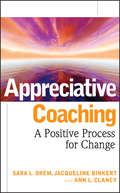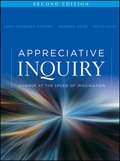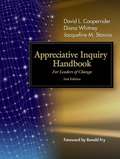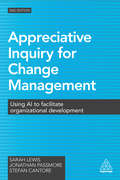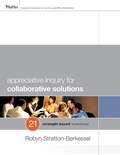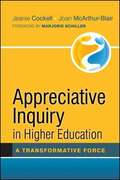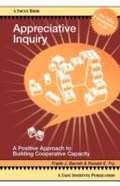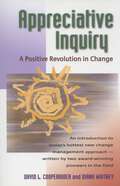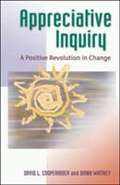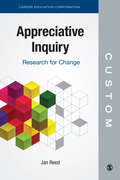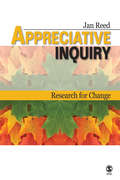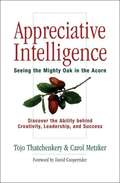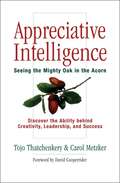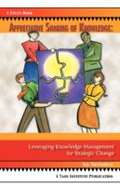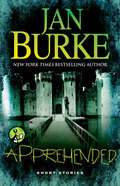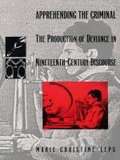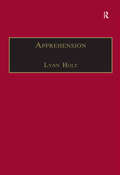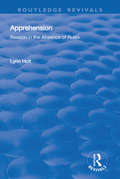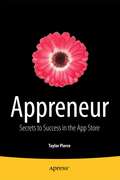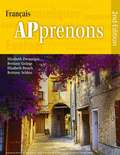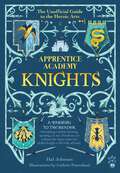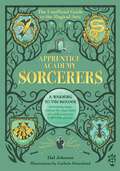- Table View
- List View
Appreciative Coaching
by Sara L. Orem Jacqueline Binkert Ann L. ClancyAppreciative Coaching describes an approach to coaching that is rooted in Appreciative Inquiry. At its core the Appreciative Coaching method shows individuals how to tap into (or rediscover) their own sense of wonder and excitement about their present life and future possibilities. Rather than focusing on individuals in limited or problem-oriented ways, Appreciate Coaching guides clients through four stages--Discovery, Dream, Design, and Destiny--that inspire them to an appreciative and empowering view of themselves and their future.
Appreciative Inquiry
by Jane Magruder Watkins Bernard J. MohrThis book shows how the Appreciative Inquiry process helps OD and HR professionals tap into inspiring "high point" accounts of personal or collective capacity. This new edition puts the focus on how AI really works and adds guidelines on how to apply AI in a variety of organizational situations and for a variety of initiatives such as coaching, leadership development, strategic planning, and teambuilding. It contains tools and other resources to help with immediate use in the workplace and new and updated case studies that show how it really works.
Appreciative Inquiry Handbook: For Leaders of Change (2nd edition)
by Diana Whitney David L. Cooperrider Jacqueline M. StavrosOne of today's most popular change methods, Appreciative Inquiry (AI) has been used to undertake transformational initiatives in dozens of organizations, ranging from McDonald's to the U.S. Navy to Save the Children. The assumption of AI is simple. Every organization has something that works right -- things that give it life when it is vital, effective, and successful. AI begins by identifying this positive core and connecting organizational visions, plans, and structures to it in ways that heighten energy and inspire action for change.
Appreciative Inquiry for Change Management: Using AI to Facilitate Organizational Development
by Jonathan Passmore Sarah Lewis Stefan CantoreAppreciative Inquiry (AI) is a widely recognised process for engaging people in organizational development and change management. Based on conversational practice, it is a particular way of asking questions, fostering relationships and increasing an organization's capacity for collaboration and change. It focuses on building organizations around what works, rather than trying to fix what doesn't, and acknowledges the contribution of individuals in increasing trust and organizational alignment and effectiveness. Appreciative Inquiry for Change Management studies AI in depth, identifying what makes it work and how to implement it to improve performance within the business. Appreciative Inquiry for Change Management explains the skills, perspectives and approaches needed for successful AI, and demonstrates how a practical conversational approach can be applied to organizational challenges in times of change. Case studies from organizations that have already integrated AI into their change management practice, including Nokia and BP, reveal why the processes are valuable and how to promote, create and generate such conversations in other organizations. Written in jargon-free language, this second edition now includes chapters on how positive psychology can enhance appreciative practice and appreciative coaching, making it an essential resource for anyone looking to implement AI in their organization.
Appreciative Inquiry for Collaborative Solutions: 21 Strength-Based Workshops
by Robyn Stratton-BerkesselA practical resource for facilitators who want to introduce positive, strength-based perspectives into their work and trainings, this book provides an overview of Appreciative Inquiry's positive psychology and strength-based change methods. Author Robyn Stratton-Berkessel explores basic principles and practices, shows you how to incorporate AI into existing work, and offers practical advice for designing new trainings. She provides a variety of ready-to-deliver workshops on topics such as leadership, diversity, technology, creativity, change, innovation, learning, collaboration, coaching, and team-building. In addition, she suggests how to make the outcomes of an Appreciative Inquiry session stick and what it takes to make these valuable approaches self-sustaining. A first in the field of Appreciative Inquiry, this important resource provides twenty one ready-to-use workshops for facilitators, leaders, consultants, and trainers who want to empower others in creating collaborative solutions.
Appreciative Inquiry in Higher Education
by Marjorie Schiller Joan Mcarthur-Blair Jeanie CockellAppreciative Inquiry in Higher Education: A Transformative Force provides practical guidance on how Appreciative Inquiry, long known as a valuable approach and process for change management and group development, can be applied in higher education and make an impact on the next generation of positive change makers. The authors, noted AI practitioners committed to the use of AI in higher education, weave together their theories, concepts, and unique stories with those of colleagues from around the world to show how AI can harness the drive and imagination of individuals, groups, and institutions. The book builds on the foundations of AI and takes the reader on an ever-deepening journey of how AI can be used to help leaders, practitioners, faculty, and organizational developers achieve new and evolving goals. Designed as both a thought-provoking and a practical resource, Appreciative Inquiry in Higher Education reveals why AI is such a vital process and shows what it takes to apply AI to such tasks as planning, summits, developing collaborative teams and groups, and teaching and learning. The book gives practitioners the theoretical concepts to ground their work and links AI to the positive psychology and strengths work that has influenced educational approaches in the first decade of the 21st century.
Appreciative Inquiry: A Positive Approach To Building Cooperative Capacity
by Frank J. Barrett Ronald E. FryThis book provides a concise introduction to and overview of the growing discipline and practice of Appreciative Inquiry (AI). If you are intrigued by the prospect of mobilizing rapid, positive change with multiple stakeholders in a human system that is important to you, this book is for you.
Appreciative Inquiry: A Positive Revolution in Change
by Diana D. Whitney David CooperriderWritten by the two most recognized Appreciative Inquiry thought leaders A quick, accessible introduction to one of the most popular change methods today--proven effective in organizations ranging from Roadway Express and British Airways to the United Nations and the United States Navy Appreciative Inquiry (AI) is a model of change management uniquely suited to the values, beliefs, and challenges of organizations today. AI is a process that emphasizes identifying and building on strengths, rather than focusing exclusively on fixing weaknesses as most other change processes do. As the stories in this book illustrate, it results in dramatic improvements in the triple bottom line: people, profits, and planet. AI has been used to significantly enhance customer satisfaction, cost competitiveness, revenues, profits, and employee engagement, retention, and morale, as well as organizations' abilities to meet the needs of society. This book is a concise introduction to Appreciative Inquiry. It provides a basic overview of the process and principles of AI along with exciting stories illustrating how organizations have applied AI and the benefits they have gained as a result. It has been specifically designed to be accessible to a wide audience so that it can be handed out in organizations where AI is either being contemplated or being implemented. Written by two of the key figures in the development of Appreciative Inquiry, this is the most authoritative guide available to a change method that systematically taps the potential of human beings to make themselves, their organizations, and their communities more adaptive and more effective.
Appreciative Inquiry: A Positive Revolution in Change
by Diana Whitney David L. CooperriderThis short, practical guide offers an approach to organizational change based on the possibility of a more desirable future, experience with the whole system, and activities that signal "something different is happening this time."
Appreciative Inquiry: Research For Change (Custom CEC Edition)
by Jan ReedAppreciative Inquiry: Research for Change is the first book dedicated to exploring appreciative inquiry (AI) as an approach to change-focused research. More than ever, students and researchers seek to do more than report on what they see following a research study or project, but rather engage the research environment (participants, stakeholders) to promote change. In other words, their studies are as much research-based as they are meant to initiate or sustain social or organizational change. Very often, the nature of this dual purpose - research and change - requires the researcher to use nontraditional approaches that bridge the theory-practice gap. In this book, author Jan Reed draws on the work of David Cooperrider and other pioneers in the area of AI to bridge the current gap between consulting activity and academic research in AI. <p><p> The book begins with real-world, international insights and experiences of AI as a research methodology and offers the history and principles of AI. Next, it provides ways of linking and differentiating these activities and exploring the range of ways to engage AI in change-focused research and practice - from research question and research design through data collection, data analysis, interpretation, and dissemination of findings. And perhaps most importantly, the book places AI in the context of other research paradigms and approaches, addressing positivist versus naturalistic stances, social constructionist concepts, and related methods and methodologies such as action research, PAR, ethnography, case studies, and narrative inquiry. <p> This book is appropriate for use in graduate-level methods courses devoted to appreciative inquiry, change- or community-based research, organizational development and change, and related topics across the social sciences, education, and management. It will also prove invaluable to researchers and professionals who are interested in using AI but need to know how to frame this approach within the greater context of traditional research.
Appreciative Inquiry: Research for Change
by Jan ReedAppreciative Inquiry: Research for Change is the first book to explore in depth the issues that arise when appreciative inquiry is used as a research framework, rather than an organizational development tool. Author Jan Reed draws upon her own experience of using Appreciative Inquiry (AI) as a research approach—shaping the asking of questions, the gathering of information, and the communication of ideas.
Appreciative Intelligence: Seeing the Mighty Oak in the Acorn
by Tojo Thatchenkery Carol MetzkerWith a nod to Howard Gardner's ideas on multiple intelligences, Thatchenkery (organizational learning, George Mason U.) and Metzker (M.S.) introduce appreciative intelligence as the ability to perceive positive potential. Drawing on neuroscience and interviews with people with innovative solutions, they treat the reality-reframing concept in areas as diverse as technological advances and Middle East peace. Exercises for assessing, and tools for developing, appreciative intelligence are included.
Appreciative Intelligence: Seeing the Mighty Oak in the Acorn
by Tojo Thatchenkery Carol MetzkerAppreciative Intelligence provides a new answer to what enables successful people to dream up their extraordinary and innovative ideas; why employees, partners, colleagues, investors, and other stakeholders join them on the path to their goals, and how they achieve these goals despite obstacles and challenges. It is not simple optimism. People with appreciative intelligence are realistic and action oriented--they have the ability not just to identify positive potential, but to devise a course of action to take advantage of it. Drawing on their own original research and recent discoveries in psychology and cognitive neuroscience, Thatchenkery and Metzker outline the evidence for appreciative intelligence, detail its specific characteristics, and show how you can develop this skill and use it in your own life and work. They show how the most successful leaders are able to spread appreciative intelligence throughout an organization, and they offer tools and exercises you can use to increase your own level of appreciative intelligence and so become more creative, resilient, successful, and personally fulfilled.
Appreciative Sharing of Knowledge: Leveraging Knowledge Management for Strategic Change
by Tojo ThatchenkeryThis book is dedicated to the development of social constructionist theory and practices for purposes of world benefit. Constructionist theory and practice locate the source of meaning, value and action in communicative relations among people. Chief importance is placed on relational process and its outcomes for the welfare of all. These books are designed for scholars, practitioners, students and the openly curious.
Apprehended
by Jan BurkeFrom the New York Times bestselling suspense author Jan Burke comes a brand-new e-short story with the added bonus of three short stories from the Eighteen anthology. Apprehended is a mini-anthology containing a brand new short story from Jan Burke: "The Unacknowledged," which features the fan-favorite investigative reporter Irene Kelly, back in her journalism school days. Also included are three short stories from the previously published Eighteen: "Why Tonight," "A Fine Set of Teeth," and "A Man of My Stature."
Apprehending the Criminal: The Production of Deviance in Nineteenth Century Discourse
by Marie-Christine LepsIn this wide-ranging analysis, Marie-Christine Leps traces the production and circulation of knowledge about the criminal in nineteenth-century discourse, and shows how the delineation of deviance served to construct cultural norms. She demonstrates how the apprehension of crime and criminals was an important factor in the establishment of such key institutions as national systems of education, a cheap daily press, and various welfare measures designed to fight the spread of criminality.Leps focuses on three discursive practices: the emergence of criminology, the development of a mass-produced press, and the proliferation of crime fiction, in both England and France. Beginning where Foucault's work Discipline and Punish ends, Leps analyzes intertextual modes of knowledge production and shows how the elaboration of hegemonic truths about the criminal is related to the exercise of power. The scope of her investigation includes scientific treatises such as Criminal Man by Cesare Lombroso and The English Convict by Charles Goring, reports on the Jack the Ripper murders in The Times and Le Petit Parisien, the Sherlock Holmes stories, Stevenson's Strange Case of Dr. Jekyll and Mr. Hyde, and novels by Zola and Bourget.
Apprehension: Reason in the Absence of Rules
by Lynn HoltThis book introduces and explores the role of apprehension in reasoning - setting out the problems, determining the vocabulary, fixing the boundaries, and questioning what is often taken for granted. Lynn Holt argues that a robust conception of rationality must include intellectual virtues which cannot be reduced to a set of rules for reasoners, and argues that the virtue of apprehension, an acquired disposition to see things correctly, is required if rationality is to be defensible. Drawing on an Aristotelian conception of intellectual virtue and examples from the sciences, Holt shows why impersonal standards for rationality are misguided, why foundations for knowledge are the last elements to emerge from inquiry not the first, and why intuition is a poor substitute for virtue. By placing the current scene in historical perspective, Holt displays the current impasse as the inevitable outcome of the replacement of intellectual virtue with method in the early modern philosophical imagination. Written in an engaging and jargon-free style, this book is of interest to a wide range of readers, particularly epistemologists and philosophers of science concerned with the fate of reason.
Apprehension: Reason in the Absence of Rules
by Lynn HoltThis title was first published in 2002. This work introduces and explores the role of apprehension in reasoning - setting out the problems, determining the vocabulary, fixing the boundaries and questioning what is often taken for granted. The author argues that a robust conception of rationality must include intellectual virtues which cannot be reduced to a set of rules for reasoners, and argues that the virtue of apprehension, an acquired disposition to see things correctly, is required if rationality is to be defensible. Drawing on an Aristotelian conception of intellectual virtue and examples from the sciences, the author shows why impersonal standards for rationality are misguided, why foundations for knowledge are the last elements to emerge from inquiry not the first, and why intuition is a poor substitute for virtue. By placing the current scene in historical perspective, the author displays the current impasse as the inevitable outcome of the replacement of intellectual virtue with method in the early modern philosophical imagination.
Appreneur: Secrets to Success in the App Store
by Taylor PierceYou are interested in making an app. You have read all of the stories of successful developers and appreneurs. You are determined to get a piece of the pie. The world of apps is the fastest growing market in the world today, and it is here to stay. The best part is you can get in on it! Now what if I told you that without the knowledge contained in this book the odds of you making a profit are slim to none? What if I also told you that you probably wouldn't break even? There is more to apps than most people think. The average person assumes that if they make an app, they will instantly become a millionaire. The truth is without the knowledge from years of successes and failures, you just won't know where to begin. Appreneur book contains tips, tricks, secrets, and stories from the top developers, appreneurs, and companies from around the globe. After reading this book, you will have the knowledge to bring your idea to life, market it, promote it, and sell it in a way that would have otherwise been impossible. What you'll learn How to start at the bottom and rise to the top How to choose the right development and platform for you How to create a market for yourself instead of playing the competition How to generate revenue from various app business models available How to figure out what's hot versus what's not How to make the most of your advertising dollars What is free to pay (F2P) model and how to take advantage of it How to secure your rights and later sell your rights to cash out or "hit it big" How to evolve with the app stores and keep piracy to a minimum Who this book is for This book is for aspiring indie mobile app developers, especially those who want to build and sell apps on Apple iTunes App Store. Table of Contents Starting at the Bottom and Rising to the Top Choosing the Right Development Option for You Don't Compete in a Market; Create it Generating Revenue from Various Business Models Managing Users for Today for Success Tomorrow What's Hot and What's Not Making the Most of your Advertising Money Plan to Scale or Your App Will Fail Life Cycles of Apps Selling The Rights and Cashing Out Keeping Piracy to a Minimum Evolving with the App Store Appendix: Guest Chapter by Appversal
Apprenons: Francais
by Elizabeth Zwanziger Brittany Goings Elizabeth Rench Brittany Selden GriffinNIMAC-sourced textbook
Apprentice Academy: The Unofficial Guide to the Heroic Arts (Apprentice Academy)
by Hal JohnsonCongratulations on your acceptance to the Apprentice Academy, one of the world’s finest institutions for knightly education. Your course of study here will prepare you for a career as a knight, samurai, Viking, or really any type of sword-swinging warrior. Swinging a sword is inherently dangerous, but this guide will help you complete your education while minimizing the twin risks of 1. getting maimed and 2. working too hard.Learn how to:• Fight people!• Fight dragons!• Fight monsters!• Fight everything else!• Die honorably!• And more!Please follow all instructions carefully. If you go off on your own and try something silly, and then get your head chopped off or your body bitten in two, don’t start drafting a letter of complaint. You had fair warning.
Apprentice Academy: The Unofficial Guide to the Magical Arts (Apprentice Academy)
by Hal JohnsonFor readers who have always wanted to enroll in a school for magic--be it Hogwarts with Harry Potter or Camp Halfblood with Percy Jackson! Wizard lovers will delight in pretending they’re learning magic from a cheat-sheet handbook from an elite school for sorcery.Welcome to the Apprentice Academy. Congratulations on your acceptance to one of the world’s finest institutions for sorcery. Your course of study here will be long and perilous, but this book of sorcery skills and fascinating tales from the world of magic will help you along the way—ideally with all your limbs and wits intact.Learn how to:· Read minds!· Prophesize!· Perform a love spell!· Choose an animal familiar!· Turn anything into gold!· Summon demons!· Find a lair!· And more!But most of all learn to cheat, or, rather, to weasel through without actually cheating.Please follow all instructions carefully, as one wrong move can transform your hands into forks or serpents, and then you will have a hard time turning the page.Inspired by folklore and mythology around the world, Apprentice Academy: Sorcerers is a rich, multicultural exploration and celebration of magic from not just Europe, but also from Africa, Asia, the Middle East, and the Americas. Narrated by a witty and weaseling character who supplies cheat sheets to students, Apprentice Academy opens the door on an exciting new world of magic and myth, chivalry and royalty, with the second book in the series–Knights–scheduled for Spring 2024.

